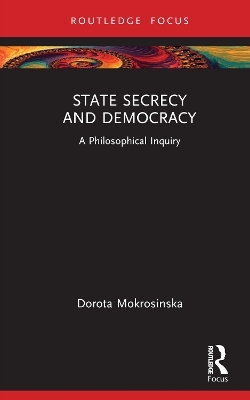
State Secrecy and Democracy
A Philosophical Inquiry
Seiten
2023
Routledge (Verlag)
978-0-367-53923-8 (ISBN)
Routledge (Verlag)
978-0-367-53923-8 (ISBN)
State Secrecy and Democracy: A Philosophical Inquiry is essential reading for those in political philosophy, ethics, politics, international relations and security studies and law.
In the wake of controversial disclosures of classified government information by WikiLeaks and Edward Snowden, questions about the democratic status of secret uses of political power are rarely far from the headlines. Despite an increase in initiatives aimed at enhancing government transparency – such as freedom of information or sunshine laws – secrecy persists in both the foreign and domestic policy of democratic states, in the form of classified intelligence programs, espionage, secret military operations, diplomatic discretion, closed-door political bargaining, and bureaucratic opacity.
This book explores whether the state’s claim to restrict access to information can be justified. Dorota Mokrosinska answers this question with a qualified "yes," arguing that secrecy in exercising executive and legislative power can be seen as a legitimate exercise of democratic authority rather than as its justified suspension.
Past and recent examples of state secrecy are used throughout the book, including the Manhattan Project, decision-making leading to the Iraq War, the extraordinary renditions programs and secret detention sites in Eastern Europe, collaboration between international secret services, and the WikiLeaks and Snowden disclosures.
State Secrecy and Democracy: A Philosophical Inquiry is essential reading for those in political philosophy, ethics, politics, international relations and security studies, and law.
In the wake of controversial disclosures of classified government information by WikiLeaks and Edward Snowden, questions about the democratic status of secret uses of political power are rarely far from the headlines. Despite an increase in initiatives aimed at enhancing government transparency – such as freedom of information or sunshine laws – secrecy persists in both the foreign and domestic policy of democratic states, in the form of classified intelligence programs, espionage, secret military operations, diplomatic discretion, closed-door political bargaining, and bureaucratic opacity.
This book explores whether the state’s claim to restrict access to information can be justified. Dorota Mokrosinska answers this question with a qualified "yes," arguing that secrecy in exercising executive and legislative power can be seen as a legitimate exercise of democratic authority rather than as its justified suspension.
Past and recent examples of state secrecy are used throughout the book, including the Manhattan Project, decision-making leading to the Iraq War, the extraordinary renditions programs and secret detention sites in Eastern Europe, collaboration between international secret services, and the WikiLeaks and Snowden disclosures.
State Secrecy and Democracy: A Philosophical Inquiry is essential reading for those in political philosophy, ethics, politics, international relations and security studies, and law.
Dorota Mokrosinska is an Associate Professor at the Institute for Philosophy, Leiden University, the Netherlands. She is the author of Rethinking Political Obligation: Moral Principles, Communal Ties, Citizenship (2012), co-editor (with B. Roessler) of Social Dimensions of Privacy: Interdisciplinary Perspectives (2015), and Secrecy and Transparency in European Democracies: Contested Trade-Offs (Routledge, 2020).
1. Introduction 2. Government transparency: grounds and limits 3. Reclaiming raison d’état: the necessity of executive secrecy 4. Do states have a right to privacy? 5. Democratic authority of government secrecy 6. Legislative secrecy in deliberation and voting co-authored with Suzanne Bloks. Bibliography Index
| Erscheinungsdatum | 26.10.2023 |
|---|---|
| Reihe/Serie | Routledge Focus on Philosophy |
| Verlagsort | London |
| Sprache | englisch |
| Maße | 138 x 216 mm |
| Gewicht | 240 g |
| Themenwelt | Kunst / Musik / Theater |
| Geisteswissenschaften ► Philosophie ► Ethik | |
| Sozialwissenschaften ► Kommunikation / Medien ► Medienwissenschaft | |
| ISBN-10 | 0-367-53923-3 / 0367539233 |
| ISBN-13 | 978-0-367-53923-8 / 9780367539238 |
| Zustand | Neuware |
| Informationen gemäß Produktsicherheitsverordnung (GPSR) | |
| Haben Sie eine Frage zum Produkt? |
Mehr entdecken
aus dem Bereich
aus dem Bereich


